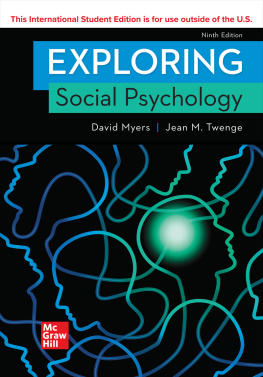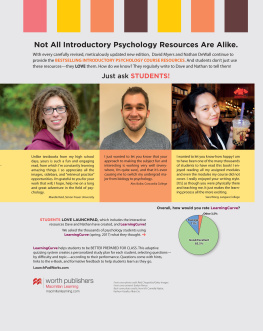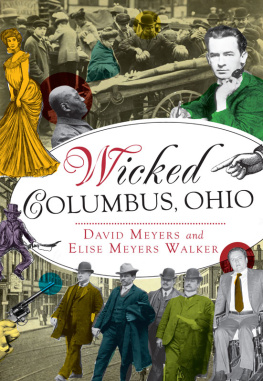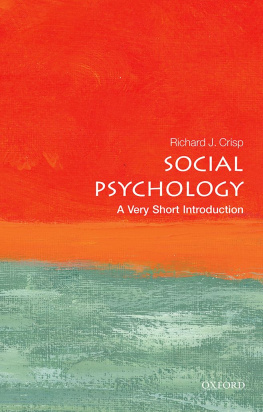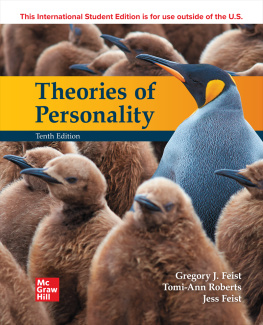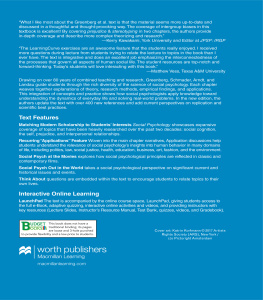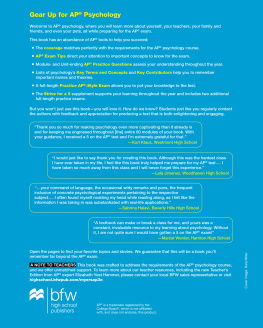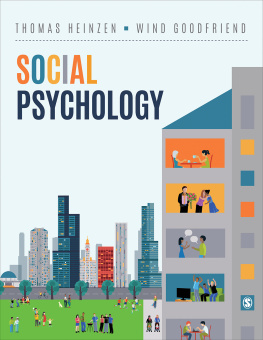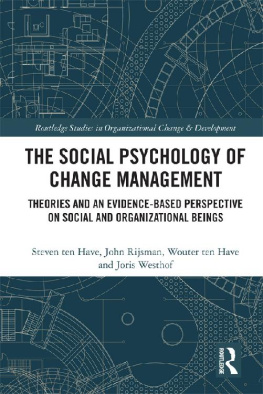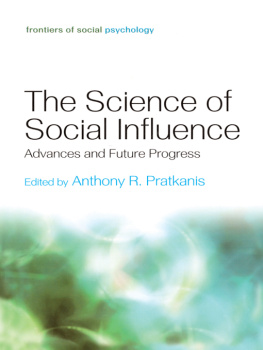Pages

page i
Exploring Social
Psychology
NINTH EDITION

David G. Myers
Hope College
Jean M. Twenge
San Diego State University

page ii

EXPLORING SOCIAL PSYCHOLOGY
Published by McGraw Hill LLC, 1325 Avenue of the Americas, New York, NY 10121. Copyright 2021 by McGraw Hill LLC. All rights reserved. Printed in the United States of America. No part of this publication may be reproduced or distributed in any form or by any means, or stored in a database or retrieval system, without the prior written consent of McGraw Hill LLC, including, but not limited to, in any network or other electronic storage or transmission, or broadcast for distance learning.
Some ancillaries, including electronic and print components, may not be available to customers outside the United States.
This book is printed on acid-free paper.
1 2 3 4 5 6 7 8 9 LCR 24 23 22 21 20
ISBN 978-1-260-57072-4
MHID 1-260-57072-X
Cover Image: Shutterstock/Lightspring
All credits appearing on page or at the end of the book are considered to be an extension of the copyright page.
The Internet addresses listed in the text were accurate at the time of publication. The inclusion of a website does not indicate an endorsement by the authors or McGraw Hill LLC, and McGraw Hill LLC does not guarantee the accuracy of the information presented at these sites.
mheducation.com/highered
page iii
About the Authors

S ince receiving his Whitworth University BA and his University of Iowa PhD, David Myers has professed psychology at Michigans Hope College. Hope College students have invited him to be their commencement speaker and voted him outstanding professor.
With support from National Science Foundation grants, Myerss research has appeared in some three dozen scientific books and periodicals, including Science, the American Scientist, Psychological Science, and the American Psychologist.
He has also communicated psychological science through his articles appearing in four dozen magazines, from Todays Education to Scientific American, and through his 17 books, including The Pursuit of Happiness and Intuition: Its Powers and Perils.

Photo by Steven Herppich, courtesy of Hope College Public Affairs and Marketing For more information, or to contact David Myers, visit davidmyers.org.
Myerss research and writings have been recognized by the Gordon Allport Prize, by an honored scientist award from the Federation of Associations in the Brain and Behavioral Sciences, and by the Award for Distinguished Service on Behalf of Personality-Social Psychology.
He has chaired his citys Human Relations Commission, helped found a center for families in poverty, and spoken to hundreds of college and community groups. In recognition of his efforts to transform the way America provides assistive listening for people with hearing loss (see hearingloop.org), he has received awards from the American Academy of Audiology, the Hearing Loss Association of America, and the hearing industry.
David and Carol Myers have three children and one grandchild.
As Professor of Psychology at San Diego State University, Jean M. Twenge has authored in more than 150 scientific publications on generational differences, cultural change, technology and well-being, social rejection, gender roles, self-esteem, and narcissism. Her research page iv has been covered in Time, Newsweek, the New York Times, USA Today, U.S. News and World Report, and the Washington Post; she has been featured on Today, Good Morning America, CBS This Morning, Fox and Friends, NBC Nightly News, Dateline NBC, and National Public Radio.
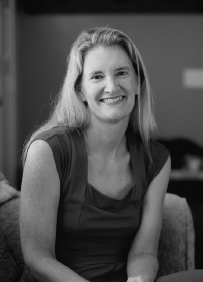
Photo courtesy of Sandy Huffaker, Jr.
She summarized this research for a broader audience in the books iGen: Why Todays Super-Connected Kids Are Growing Up Less Rebellious, More Tolerant, Less Happyand Completely Unprepared for Adulthood;Generation Me: Why Todays Young Americans Are More Confident, Assertive, Entitledand More Miserable Than Ever Before; and The Narcissism Epidemic: Living in theAge of Entitlement (coauthored with W. Keith Campbell). She has written for general audiences on several websites and magazines, including a piece for The Atlantic that was nominated for a National Magazine Award. She frequently gives talks and seminars on generational differences to audiences such as college faculty and staff, high school students and their parents, military personnel, camp directors, and corporate executives.
Dr. Twenge grew up in Minnesota and Texas. She holds a BA and MA from the University of Chicago and a PhD from the University of Michigan. She completed a postdoctoral research fellowship in social psychology at Case Western Reserve University. She lives in San Diego with her husband and three daughters.
page v
Brief Contents

page vi

page vii
Contents

page viii
page ix
page x
page xi
page xii
page xiii
page xiv
page xv
page xvi
Preface

T his is a book I (David) secretly wanted to write. I have long believed that what is wrong with all psychology textbooks (including those I have written) is their overlong chapters. Few can read a 40-page chapter in a single sitting without their eyes glazing and their mind wandering. So why not organize the discipline into digestible chunkssay forty 15-page chapters rather than fifteen 40-page chaptersthat a student could read in a sitting, with a sense of completion?
Thus, when McGraw-Hill psychology editor Chris Rogers first suggested that I abbreviate and restructure my 15-chapter, 600-page Social Psychology into a series of crisply written modules, I said Eureka! At last a publisher willing to break convention by packaging the material in a form ideally suited to students attention spans. By presenting concepts and findings in smaller bites, we also hoped not to overload students capacities to absorb new information. And, by keeping Exploring Social Psychology slim, we sought to enable instructors to supplement it with other reading.
As the playful module titles suggest, my coauthor, Jean Twenge, and I have also broken with convention by introducing social psychology in an essay format. Each is written in the spirit of Thoreaus admonition: Anything living is easily and naturally expressed in popular language. Our aim in the parent

